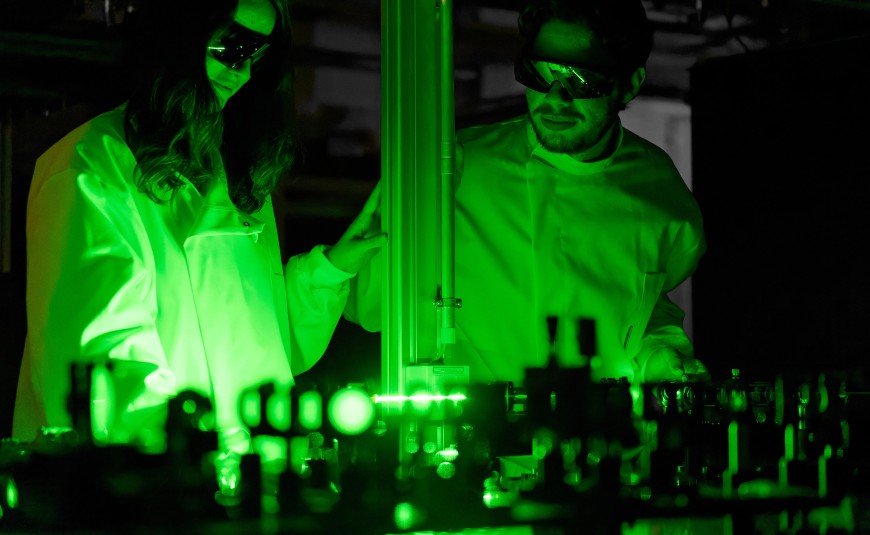Cutting-edge technology for the paediatric cancer ward
MultiDrug-TDM: New LOEWE research cluster for medical technology
2025/07/29
The new LOEWE research cluster ‘MultiDrug-TDM’, coordinated by TU Darmstadt, will receive 4.3 million euros state funding for four years, starting in January. The goal is to research a novel, intelligent sensor system to significantly improve paediatric cancer care. By measuring drug levels directly at the bedside, immediate adjustments and thus optimised personalized therapy will be possible.

Standard therapies often fall short in children, as individual metabolic differences are rarely considered. But especially in cancer treatment, precise, personalised dosages are crucial to ensure both effective and gentle therapy. This is where the new interdisciplinary LOEWE research cluster ‘Personalised biomedical engineering for therapeutic drug monitoring at the point of care in paediatric oncology – MultiDrug-TDM’ takes action: A team from TU Darmstadt and Goethe University Frankfurt is researching an innovative sensor system that measures drug concentrations in body fluids in real time, thus enabling personalised treatment for young patients. The project is coordinated by Professor Torsten Frosch, Institute of Biophotonics – Biomedical Engineering at TU Darmstadt.
Research into a highly innovative sensor system
The new LOEWE research cluster MultiDrug-TDM focuses on research into a highly innovative sensor system that can be used to determine the levels of life-saving drugs in paediatric cancer patients directly at the point of care using minimal blood samples. This enables real-time dose adjustments during ward rounds. To date, blood samples have to be sent to specialised laboratories, which prevents timely dose adjustments. Thus, optimal therapy is currently not possible. MultiDrug-TDM will shift the paradigm for therapeutic drug monitoring (TDM): With a portable point-of-care device, physicians could make informed decisions for optimised personalised therapy directly at the bedside – fast, data-based and patient-centred.
This will improve both efficacy and safety of the treatment and will noticeably reduce the workload of medical staff. For the use in clinics, the adaptive approach of the new sensor system is particularly groundbreaking: the measurement parameters of the sensor system are adjusted in real time automatically, meaning that the device can be used without specially trained technical staff. This adaptive approach of MultiDrug-TDM is a first step towards a self-optimizing, intelligent medical sensor technology of the future.
Excellent Hessian expertise from different disciplines
MultiDrug-TDM forms a strong alliance of leading experts from Hesse, spanning multiple disciplines. Technological advances in biosensor technology and AI-supported signal processing and data analysis – represented by seven research groups at TU Darmstadt – are paired with top medical expertise in paediatric oncology and clinical pharmacology at the Faculty of Medicine at Goethe University Frankfurt. “We can only achieve real impact through interdisciplinary collaboration. Complex challenges in biomedical engineering can only be solved when we combine all perspectives, learn from each other and develop a common language. This is exactly what we aim for with MultiDrug-TDM,” says Professor Torsten Frosch, head of the Institute of Biophotonics – Biomedical Engineering at TU Darmstadt and scientific coordinator of MultiDrug-TDM.
‘I am delighted that MultiDrug-TDM will be our third current LOEWE research cluster at TU Darmstadt,’ says TU President Tanja Brühl. “The funding emphasises the relevance and innovative power of interdisciplinary research and networking. In this research project focused on biomedical engineering, engineers and physicians are working together in the Rhine Main University (RMU) network to develop and improve personalised medicine in paediatric oncology.”
‘I am delighted that MultiDrug-TDM will be our third current LOEWE research cluster at TU Darmstadt.
TU President Professor Tanja Brühl
Interdisciplinary research focus on medical technology
The project is based in the field of biomedical engineering, a young, interdisciplinary research focus at TU Darmstadt, which has been specifically strengthened by strategic new appointments and the biomedical engineering study programme offered jointly with the University Medicine at Goethe University. The research is embedded in a growing network in Hesse. In the future, the MultiDrug-TDM network may evolve into a collaborative research centre on ‘Intelligent Biosensing’. The technological innovations will also have a wide-ranging impact on the Hessian innovation landscape.
Alongside ‘FLOW FOR LIFE’ and ‘WhiteBox’, MultiDrug-TDM is the third current LOEWE research cluster at TU Darmstadt.
Background
LOEWE research clusters are one of the funding lines under the Hessian “State Offensive for the Development of Scientific and Economic Excellence (LOEWE)”. They bundle existing thematically related research capacities across several universities and/or research institutions. The aim is to strengthen and raise the profile of the Hessian research landscape by funding strategically important and innovative projects. The funding of LOEWE research clusters is intended to contribute to the development of certain research areas into nationally and internationally visible research clusters.
sip


